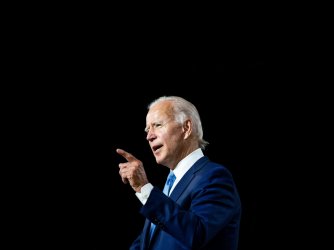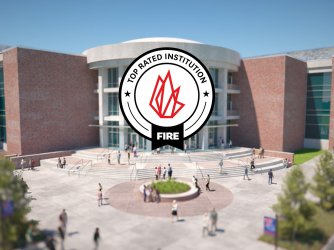Table of Contents
Mike Huckabee (Erroneously) Opines that LSU Counter-Protestors Were Engaged in Protected Speech
Last week, we wrote about a protest by Louisiana State University (LSU) graduate student Benjamin Haas, the ensuing counter-protest at LSU, and Chancellor Michael Martin's response to the whole situation.
Haas originally expressed his intent to hold a protest at the LSU parade grounds, where he planned to burn an American flag. After failing to obtain the necessary burn permit, Haas decided instead to read a statement aloud. In response, a massive counter-protest was held at LSU. While Haas and another student were attempting to speak, the large and unruly crowd of counter-protestors shouted them down, and some began to throw bottles and other trash at Haas, despite the presence of mounted police. Eventually, the scene became hostile enough that police had to escort Haas to another location for his own safety.
Late last week, FOX News host and former Arkansas governor/presidential hopeful Mike Huckabee waded into the debate, regrettably coming to the defense of the trash-hurling counter-protestors.
With regard to the Supreme Court's decision in Texas v. Johnson, 491 U.S. 397 (1989), which held that flag burning is protected expressive conduct under the First Amendment, Huckabee wrote in an email that the Court
ruled that burning an American flag was protected free speech . . . but they never said people who did it were immune to other people's free speech.
and that the counter-protestors
followed the Court's lead by interpreting actions as speech by throwing trash and water balloons at Haas.
Huckabee is only slightly correct, and has fallen prey to an unfortunately common misconception that the First Amendment stretches farther than it does. It is true that the First Amendment is no shelter from criticism of the free speech of others; indeed, FIRE believes that the remedy to bad speech—rather than reflexive censorship—is more speech. However, the conduct that Huckabee seeks to justify is actually not protected speech. Throwing objects at a person with the intent to scare or harm the target is, quite plainly, not protected expressive activity. It's the same difference between burning a flag while holding it on the ground in front of you (protected) and throwing a burning flag at someone (definitely not protected). As Justice Douglas eloquently stated in his concurring opinion in Samuels v. Mackell, 401 U.S. 66 (1971):
Certainly violence has no sanctuary in the First Amendment, and the use of weapons, gunpowder, and gasoline may not constitutionally masquerade under the guise of "advocacy."
And even more directly, in Wisconsin v. Mitchell, 508 U.S. 476 (1993), the Supreme Court explicitly said:
To be sure, our cases reject the "view that an apparently limitless variety of conduct can be labeled 'speech' whenever the person engaging in the conduct intends thereby to express an idea." Thus, a physical assault is not by any stretch of the imagination expressive conduct protected by the First Amendment.
Not only does the conduct of the trash-throwers constitute a crime, but it also constitutes a heckler's veto. A "heckler's veto" occurs when a person or group of people successfully suppresses protected speech by means of threatening or carrying out disruptive or violent actions as a response to the speech. In this way, those who heckle speech can actually veto its transmission, censoring speech by means of their vigilante efforts. For a more in-depth discussion of the heckler's veto, see this article.
By creating a disorderly and riotous atmosphere, the counter-protestors made it necessary for the police to remove Haas for his own safety, and prevented him from fully exercising his First Amendment rights. Though—thankfully—Haas was not punished in any way for the misconduct of the counter-protestors, the result is still unacceptable from a free speech perspective. Further, the criminal activity also risks prompting the LSU administration to seek to restrict speakers and viewpoints that are likely to provoke contempt or outrage in the future. While Chancellor Martin's statement gives us hope that this is unlikely, it certainly wouldn't be the first time that it happened. With all of the threats to student speech on college campuses, students can ill afford to become their own enemy.
The bottom line is this: throwing trash at those engaged in peaceful protest is not only criminal conduct that is unprotected by the First Amendment, but it is also a dangerous affront to the First Amendment rights of all students. Bad speech should be remedied with more speech. The First Amendment does not protect those who cross the line from impassioned expression to violent conduct.
Recent Articles
FIRE’s award-winning Newsdesk covers the free speech news you need to stay informed.

TikTok legislation sets grave precedent for free speech

FIRE joins animal advocates, free speech groups urging Ninth Circuit to affirm ruling that allows undercover audio recording

Louisiana Tech earns top rating for free speech
